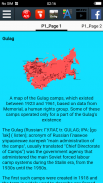








Gulag History

คำอธิบายของGulag History
The Gulag (Russian: ГУЛАГ, tr. GULAG; IPA: [ɡʊˈlak] acronym of Russian Главное управление лагерей "main administration of the camps", usually translated "Chief Directorate of Camps") was the government agency that administered the main Soviet forced labour camp systems during the Stalin era, from the 1930s until the 1950s.
The first such camps were created in 1918 and the term is widely used to describe any forced labor camp in the USSR. While the camps housed a wide range of convicts, from petty criminals to political prisoners, large numbers were convicted by simplified procedures, such as NKVD troikas and other instruments of extrajudicial punishment (the NKVD was the Soviet secret police). The Gulag is recognized as a major instrument of political repression in the Soviet Union, based on Article 58 (RSFSR Penal Code). The term is also sometimes used to describe the camps themselves, particularly in the West.
ป่าช้า. (รัสเซีย: ГУЛАГ, TR ป่าช้า; IPA: [ɡʊlak] คำย่อของรัสเซียГлавноеуправлениелагерей "การบริหารหลักของค่าย" มักจะแปลว่า "ประธานกรรมการของแคมป์") เป็นหน่วยงานของรัฐที่บริหารหลักของสหภาพโซเวียตการบังคับใช้แรงงาน ระบบค่ายในช่วงยุคสตาลินจากปี 1930 จนถึงปี 1950
ค่ายดังกล่าวครั้งแรกที่ถูกสร้างขึ้นในปี 1918 และเป็นคำที่ใช้กันอย่างแพร่หลายในการอธิบายใด ๆ ค่ายบังคับใช้แรงงานในสหภาพโซเวียต ในขณะที่ค่ายที่ตั้งที่หลากหลายของนักโทษจากอาชญากรนักโทษการเมืองจำนวนมากถูกตัดสินโดยขั้นตอนง่ายเช่น troikas NKVD และเครื่องมืออื่น ๆ ของการลงโทษวิสามัญฆาตกรรม (คน NKVD เป็นตำรวจลับของโซเวียต) ป่าช้าได้รับการยอมรับเป็นเครื่องมือสำคัญของการกดขี่ทางการเมืองในสหภาพโซเวียตอยู่บนพื้นฐานของข้อ 58 (RSFSR ประมวลกฎหมายอาญา) คำที่บางครั้งยังใช้เพื่ออธิบายค่ายของตัวเองโดยเฉพาะอย่างยิ่งในภาคตะวันตก

























